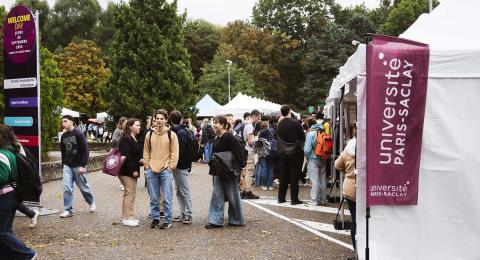Biologie-AgroSciences
The Biology and Agrosciences program trains students to develop a deep understanding of living systems within agro-ecosystems. It is based on a multidisciplinary approach encompassing all levels of biological organization and leads to a wide range of careers, including researcher, project manager, or consulting engineer.
M1 Biologie Agrosciences Biomass Engineering for Bioeconomy (M1 BEB)
M1 Biologie Agrosciences Animales (M1 BioAgro Animal)
M1 Biologie Agrosciences Plant Sciences (M1 BioAgro Plant Sciences)
M2 Biologie Agrosciences Biomass Engineering for Bioeconomy (M2 BEB)
M2 Biologie Agrosciences Predictive and Integrative Animal Biology (M2 PRIAM)
M2 Biologie Agrosciences Sciences Plant Sciences (M2 BioAgro Plant Sciences)
M2 Biologie Agrosciences Systems and Synthetic Biology (M2 SSB)
Information
Master’s Year 1
Master’s Year 2
Skills
The skills obtained from this training are as follows:
- Ability to carry out research work: analyze and problematize a research question and its object of study, analyze and synthesize existing data using specialized resources, design and implement scientific reasoning, mobilize disciplinary knowledge, define an autonomous research strategy, solve problems to develop new knowledge and/or new procedures, implement a research approach through Ad'Hoc experiments, produce and/or analyze research data related to one's discipline, make an original contribution, construct an argument, identify the process of production, dissemination and valorization of knowledge, communicate the reasoned results of one's research or reflection, conduct a critical analysis of the data produced (by one's own work or from the literature).
- Mastering and being an expert. e of the considered scientific domain : mobilise their highly specialised knowledge in a variety of learning situations, apply a scientific approach in a "concrete"/real situation, solve problems based on their knowledge in a professional context, know how to use advanced digital tools for their discipline, make contributions "in a professional context", lead a project in a collaborative framework , knowing how to place oneself in a position of responsibility in a professional context, knowing how to work in a team, knowing the professional context associated with one's discipline or field of study, developing personal and professional networks, knowing how to draw up a risk analysis, respecting H&S rules in one's field, updating one's scientific and/or regulatory knowledge, respecting the principles of ethics, deontology and environmental responsibility.
- Understanding the issues and being open to the challenges of sustainable development: understand how their discipline has an impact, whether positive or negative, on the environment, engage their thinking in the understanding of socio-ecological issues and contribute to possible responses, include their thinking and work in international debates and exchanges, contribute through their work and communications to public debate, including through popular media, understand the ethical, economic, legal and social issues related to the use of information, know how to develop/implement an international project, know how to use English for their discipline, identify the digital issues in their discipline, understand the issues of Artificial Intelligence in their discipline, work on a project that may involve multi-disciplinary skills.
Learning outcome targets
The overall aim of the course is to provide training based on knowledge of how organisms function in their agro-ecosystems and possible applications in terms of life engineering with a view to sustainability in an agro-ecological transition approach. Most courses are taught in English and some are international (ERASMUS mundus). In M1, a core curriculum provides a solid grounding in physiology, metabolism, genetics and genomics. This is supplemented by a specific project, "Adopt a gene" and "Adopt a data set", in which a student's personal project over a period of several months is to study a gene and then a complete data set provided by research teams. The foundation also provides training in statistics, bioinformatics and English, all of which are essential for contemporary biology. Lastly, the core curriculum provides open-ended teaching with scientific reflection and argumentation on themes linking science and society (epistemology and interculturality).
The M1 BioAgro Animal-M2 PRIAM (ERASMUS mundus) course trains specialists in integrative biology applied to the challenges of animal production (environment and climate, society and ethics, efficiency, animal health and welfare, diversity and conservation, etc.). The courses range from genetics (quantitative, genomics, etc.) to physiology (reproduction, nutrition, etc.) and species conservation (domestic, wild and companion). An important part is devoted to bioinformatics and biostatistics, the analysis of biomedical data and the mathematical modelling of biological processes.
The M1-M2 BioAgro Plant Sciences course trains specialists in integrative biology/plant physiology who are aware of the societal issues linked to plant production (food, environment/climate, energy, health). The teaching, both theoretical and practical, enables students to acquire a broad vision of how plants function and a mastery of the multi-scale approaches needed to understand them (from genomics/genetics to metabolic physiology). With a balance between fundamental and applied research, this course is supported by EUR Saclay Plant Sciences and is co-accredited with Université Paris Cité. A large part of the course is devoted to cultivated plants (plant/seed improvement, plant-microbiota interactions, sustainable agronomy and bioengineering). This course offers opportunities in fundamental and applied research (80% of M2 SDV research students go on to do a thesis).
M1-M2 BEB (ERASMUS mundus): M1 BEB is integrated into the European Masters in Biological and Chemical Engineering for a Sustainable Bioeconomy (Bioceb),(Erasmus Mundus). Bioceb aims to provide high-level, up-to-date training in chemical and biological engineering applied to the design and development of bio-based products and processes. The aim is to provide all students with a solid multidisciplinary scientific training in biology, chemistry and biotechnology, combined with a good knowledge of the markets for bio-based products and the assessment of the sustainability of the value chain.
M2 SSB provides students from the life sciences, mathematics, engineering, chemistry, physical sciences and computer science with a means of engaging fruitfully in collaborative work across disciplinary boundaries, with applications in systems and synthetic biology. They will also strengthen cross-disciplinary skills, such as project planning, leading a seminar, and understanding the industrial, economic and ethical issues associated with these developing fields.
All courses are organised in partnership with leading research laboratories.
Target audience
For the first year of master, the prerequisite degrees are Bachelor in Biology, Life Sciences, Health Sciences, Life Sciences and
Earth Sciences, double-degree Licences in Biology-Chemistry, Biology-Mathematics or certain equivalent courses in Professional Licences or DUTs.








